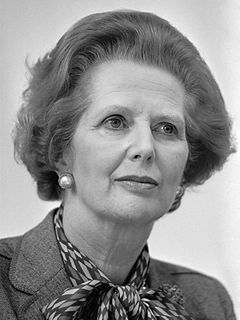
The 1983 United Kingdom general election was held on Thursday 9 June 1983. It gave the Conservative Party under the leadership of Margaret Thatcher the most decisive election victory since that of the Labour Party in 1945, with a majority of 144 seats.

The 1987 United Kingdom general election was held on Thursday, 11 June 1987, to elect 650 members to the House of Commons. The election was the third consecutive general election victory for the Conservative Party, and second landslide under the leadership of Margaret Thatcher, who became the first Prime Minister since the Earl of Liverpool in 1820 to lead a party into three successive electoral victories.
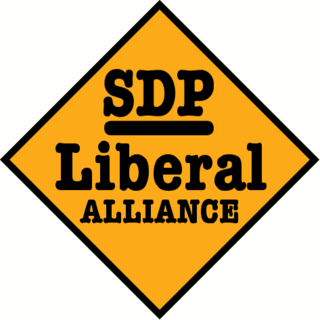
The SDP–Liberal Alliance was a centrist and social liberal political and electoral alliance in the United Kingdom.

David Anthony Llewellyn Owen, Baron Owen, is a British politician and physician who served as Secretary of State for Foreign and Commonwealth Affairs as a Labour Party MP under James Callaghan from 1977 to 1979.

David Martin Scott Steel, Baron Steel of Aikwood, is a British politician. Elected as Member of Parliament for Roxburgh, Selkirk, and Peebles, followed by Tweeddale, Ettrick, and Lauderdale, he served as the final leader of the Liberal Party, from 1976 to 1988. His tenure spanned the duration of the alliance with the Social Democratic Party, which began in 1981 and concluded with the formation of the Liberal Democrats in 1988.

The Liberal Party is a British political party that was founded in 1989 as a continuation of the original Liberal Party by former members who opposed its merger with the Social Democratic Party (SDP) to form the Liberal Democrats. The party holds eleven local council seats.

The 2005 United Kingdom general election was held on Thursday 5 May 2005, to elect 646 members to the House of Commons. The Labour Party, led by Tony Blair, won its third consecutive victory, with Blair becoming the second Labour leader after Harold Wilson to form three majority governments. However, its majority fell to 66 seats compared to the 167-seat majority it had won four years before. This was the first time the Labour Party had won a third consecutive election, and remains the party's most recent general election victory.

The 2010 United Kingdom general election was held on Thursday 6 May 2010, with 45,597,461 registered voters entitled to vote to elect members to the House of Commons. The election took place in 650 constituencies across the United Kingdom under the first-past-the-post system.

The Social Democratic Party (SDP) formed in 1988 was a political party in the United Kingdom led by David Owen which lasted for only two years. The party was formed as a result of the original Social Democratic Party, created in 1981 by the "Gang of Four" voting to turn its electoral alliance with the Liberal Party into a full merger of the two parties. The new Social and Liberal Democrats (SLD) party thus gained all of the records and assets of the original SDP.
The Dunfermline and West Fife by-election was held on 9 February 2006, following the death of the sitting Labour MP Rachel Squire, on 6 January. The by-election was the first seat to change hands in the 2005 Parliament, when Willie Rennie won the seat for the Liberal Democrats, gaining it from Labour by 1,800 votes. The BBC reported a swing from Labour to the Liberal Democrats of 16.24%.
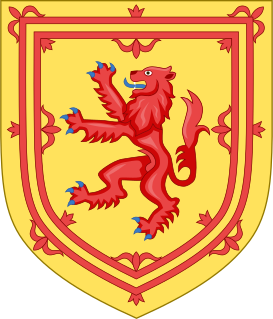
The Glasgow Central by-election, in the Glasgow Central constituency, was held on 15 June 1989. It was caused by the death of the sitting Member of Parliament, Bob McTaggart.

The 1980 Glasgow Central by-election was a by-election held on 26 June 1980 for the British House of Commons constituency of Glasgow Central, following the death of its sitting MP, Thomas McMillan.
Parliamentary by-elections in the United Kingdom occur when a Member of Parliament (MP) vacates a House of Commons seat during the course of a parliament.
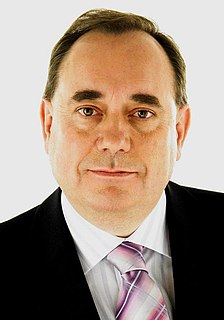
The 2011 Scottish Parliament election was held on Thursday, 5 May 2011 to elect 129 members to the Scottish Parliament.
Two Bootle by-elections were held during 1990, for the House of Commons constituency of Bootle in Merseyside.

A Glasgow Hillhead by-election was held on 25 March 1982. The by-election was caused by the death of the Conservative Party Member of Parliament for Glasgow Hillhead Tam Galbraith on 2 January 1982.
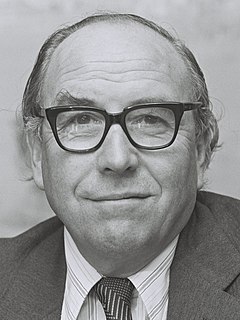
The 1981 Warrington by-election was held on 16 July 1981.

The Liberal Democrats are a liberal political party in the United Kingdom. From 2017, it has been the third-largest U.K. political party by the number of votes cast. It has 14 Members of Parliament in the House of Commons, 84 members of the House of Lords, four Members of the Scottish Parliament, one member in the Welsh Senedd and two members in the London Assembly. The party also holds 2 seats on the Manchester City Council and 12 seats on Birmingham City Council, but is not represented on Glasgow City Council. The party holds a twice-yearly Liberal Democrat Conference, at a variety of locations. The party served as the junior party in a coalition government with the Conservative Party between 2010–2015, with Scottish Labour in the Scottish Executive from 1999 to 2007, and with Welsh Labour in the Welsh Government from 2000 to 2003 and from 2016 to 2021.

The Social Democratic Party (SDP) was a centrist to centre-left political party in the United Kingdom. The party supported a mixed economy, electoral reform, European integration and a decentralised state while rejecting the possibility of trade unions being overly influential within the industrial sphere. The SDP officially advocated "social democracy", but its actual propensity is evaluated as close to social liberalism.
The fifth election to South Glamorgan County Council was held in May 1989. It was preceded by the 1985 election and followed by the 1993 election.















